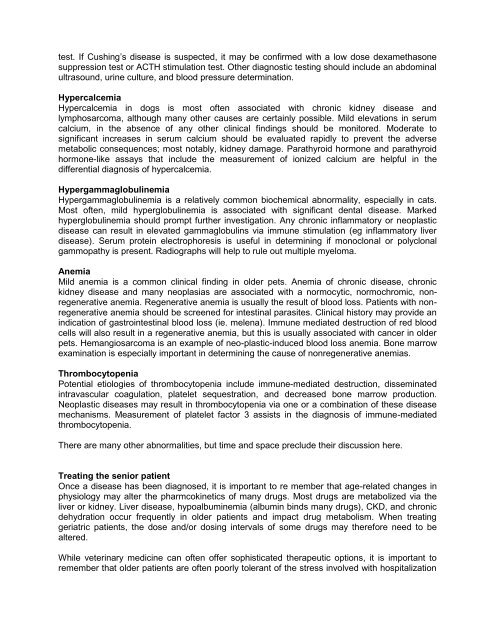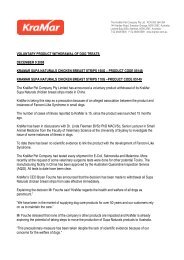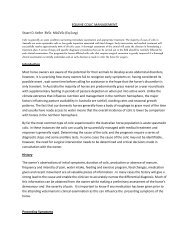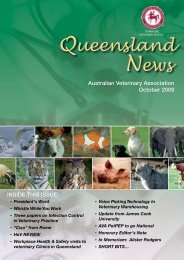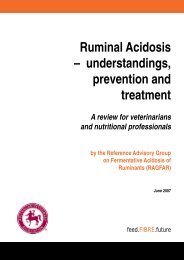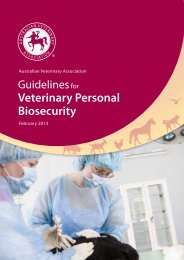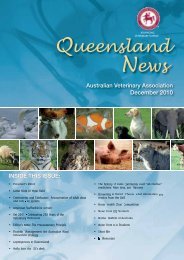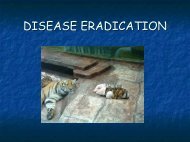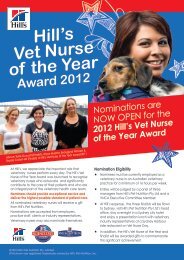Screening and Management Considerations for the Geriatric Dog ...
Screening and Management Considerations for the Geriatric Dog ...
Screening and Management Considerations for the Geriatric Dog ...
Create successful ePaper yourself
Turn your PDF publications into a flip-book with our unique Google optimized e-Paper software.
test. If Cushing’s disease is suspected, it may be confirmed with a low dose dexamethasone<br />
suppression test or ACTH stimulation test. O<strong>the</strong>r diagnostic testing should include an abdominal<br />
ultrasound, urine culture, <strong>and</strong> blood pressure determination.<br />
Hypercalcemia<br />
Hypercalcemia in dogs is most often associated with chronic kidney disease <strong>and</strong><br />
lymphosarcoma, although many o<strong>the</strong>r causes are certainly possible. Mild elevations in serum<br />
calcium, in <strong>the</strong> absence of any o<strong>the</strong>r clinical findings should be monitored. Moderate to<br />
significant increases in serum calcium should be evaluated rapidly to prevent <strong>the</strong> adverse<br />
metabolic consequences; most notably, kidney damage. Parathyroid hormone <strong>and</strong> parathyroid<br />
hormone-like assays that include <strong>the</strong> measurement of ionized calcium are helpful in <strong>the</strong><br />
differential diagnosis of hypercalcemia.<br />
Hypergammaglobulinemia<br />
Hypergammaglobulinemia is a relatively common biochemical abnormality, especially in cats.<br />
Most often, mild hyperglobulinemia is associated with significant dental disease. Marked<br />
hyperglobulinemia should prompt fur<strong>the</strong>r investigation. Any chronic inflammatory or neoplastic<br />
disease can result in elevated gammaglobulins via immune stimulation (eg inflammatory liver<br />
disease). Serum protein electrophoresis is useful in determining if monoclonal or polyclonal<br />
gammopathy is present. Radiographs will help to rule out multiple myeloma.<br />
Anemia<br />
Mild anemia is a common clinical finding in older pets. Anemia of chronic disease, chronic<br />
kidney disease <strong>and</strong> many neoplasias are associated with a normocytic, normochromic, nonregenerative<br />
anemia. Regenerative anemia is usually <strong>the</strong> result of blood loss. Patients with nonregenerative<br />
anemia should be screened <strong>for</strong> intestinal parasites. Clinical history may provide an<br />
indication of gastrointestinal blood loss (ie. melena). Immune mediated destruction of red blood<br />
cells will also result in a regenerative anemia, but this is usually associated with cancer in older<br />
pets. Hemangiosarcoma is an example of neo-plastic-induced blood loss anemia. Bone marrow<br />
examination is especially important in determining <strong>the</strong> cause of nonregenerative anemias.<br />
Thrombocytopenia<br />
Potential etiologies of thrombocytopenia include immune-mediated destruction, disseminated<br />
intravascular coagulation, platelet sequestration, <strong>and</strong> decreased bone marrow production.<br />
Neoplastic diseases may result in thrombocytopenia via one or a combination of <strong>the</strong>se disease<br />
mechanisms. Measurement of platelet factor 3 assists in <strong>the</strong> diagnosis of immune-mediated<br />
thrombocytopenia.<br />
There are many o<strong>the</strong>r abnormalities, but time <strong>and</strong> space preclude <strong>the</strong>ir discussion here.<br />
Treating <strong>the</strong> senior patient<br />
Once a disease has been diagnosed, it is important to re member that age-related changes in<br />
physiology may alter <strong>the</strong> pharmcokinetics of many drugs. Most drugs are metabolized via <strong>the</strong><br />
liver or kidney. Liver disease, hypoalbuminemia (albumin binds many drugs), CKD, <strong>and</strong> chronic<br />
dehydration occur frequently in older patients <strong>and</strong> impact drug metabolism. When treating<br />
geriatric patients, <strong>the</strong> dose <strong>and</strong>/or dosing intervals of some drugs may <strong>the</strong>re<strong>for</strong>e need to be<br />
altered.<br />
While veterinary medicine can often offer sophisticated <strong>the</strong>rapeutic options, it is important to<br />
remember that older patients are often poorly tolerant of <strong>the</strong> stress involved with hospitalization


